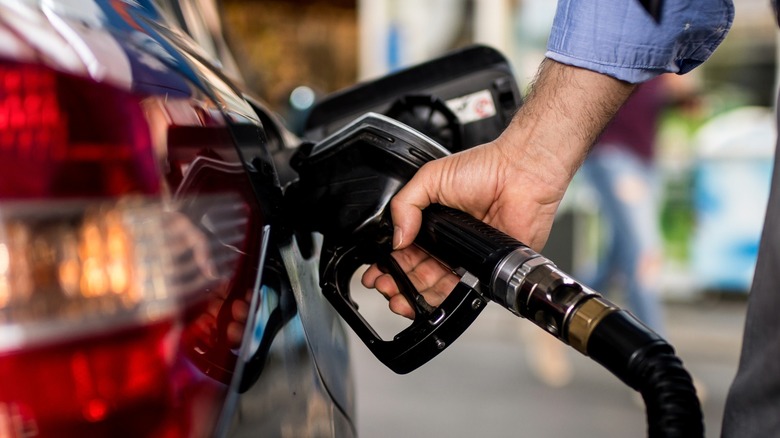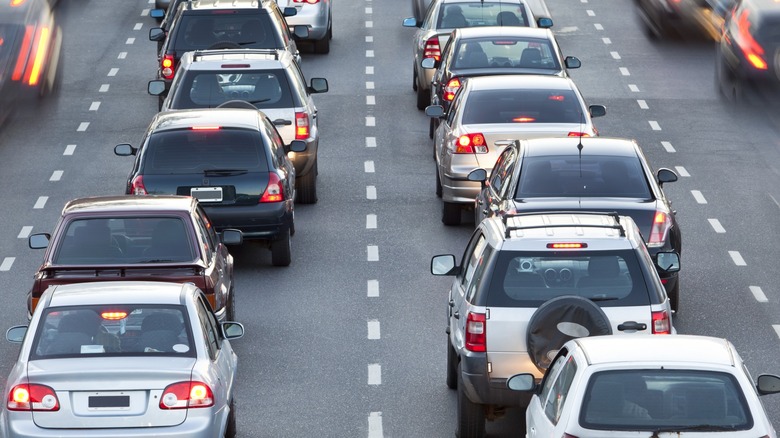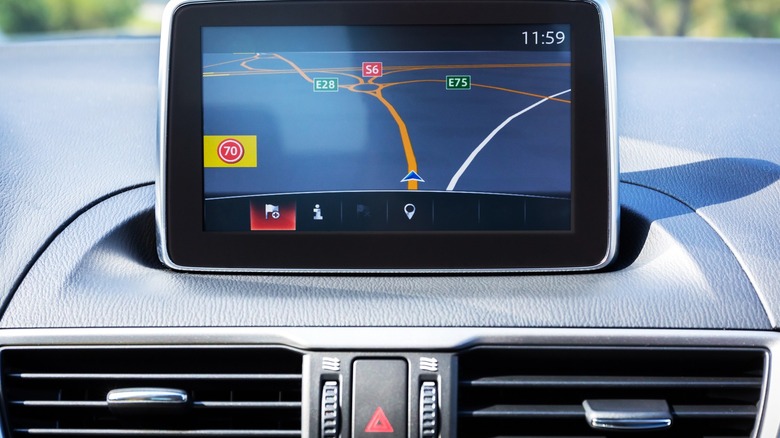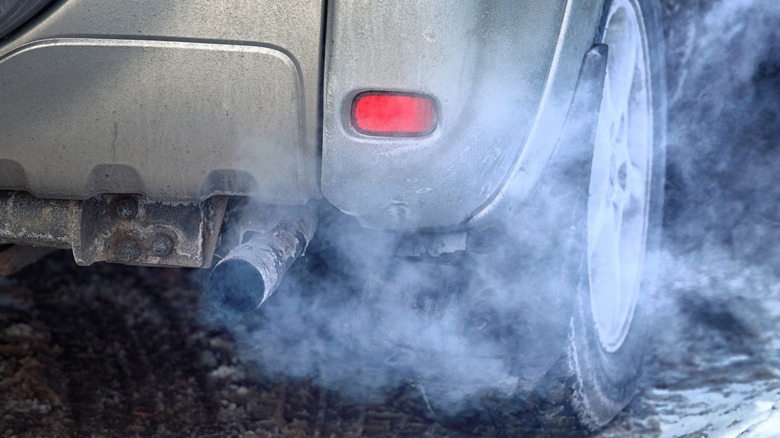5 Driving Habits Making You Spend More On Gas
Owning a car can be pretty expensive, especially every time you have to fill up the gas tank. Unfortunately, there's no catching a break from that, but there are things you can do to pinch in costs and save a few bucks on gasoline down the line. It's really simple: you just need to change a few driving habits.
There are certain driving habits that will make you spend more money on gas. These are things you may have been doing for years without even realizing how much they're costing you. That's why we're going to break down some of these habits so you can spot them and start saving. If you eliminate some of these habits, you'll likely notice a difference in how often you need to visit the gas station.
Aggressive driving
When you constantly drive over the speed limit, tailgate, change lanes abruptly, accelerate too quickly, or brake too hard, you're engaging in aggressive driving. While this behavior is undeniably unsafe, it's also a guaranteed way to waste gas.
Aggressive driving guzzles down more fuel in the tank because of the kind of pressure it places on your engine. For example, when you slam on the gas pedal or push your car past the speed limit, your engine is forced to work harder, burning more fuel than necessary. According to the U.S. Department of Energy, aggressive driving can increase your fuel consumption by about 33% when you're on the highway. Also, when you hard brake, you're wasting fuel by disrupting the car's momentum, which then requires more energy (and more fuel) to regain speed.
In essence, smooth and steady driving is the best thing for your car's fuel economy. When you ditch aggressive driving habits and embrace using cruise control on the highway, you'll start to notice how much you can save on long-term fuel costs. So, the next time you're tempted to floor it at a green light, remember: a gentle touch on the accelerator and a calm driving style can keep more gas in your tank and more money in your pocket.
Excessive idling
Idling is something you cannot always avoid when driving. It happens when you're stuck in traffic, sitting in line at a drive-through, or waiting in a parking lot to pick up a friend.
However, when you continuously leave the engine running for long stretches without moving, you are wasting fuel. According to the U.S. Department of Energy, unnecessary idling in personal vehicles wastes about 3 billion gallons of fuel each year in the United States alone.
Now, if idling excessively wastes so much fuel, what's a person to do about it? The answer to that is simple: turn off your engine for the duration of the wait. Of course, a lot of folks think restarting your car uses more fuel than leaving it running, but that no longer holds true. Modern cars are built to handle frequent restarting without any major impact on the engine.
In fact, most carmakers are designing cars now with auto stop-start technology that automatically turns off the engine when your car comes to a stop and restarts it immediately when you're ready to move. So, as soon as you take your foot off the brake pedal and place it on the gas pedal, the engine comes back on, and you're good to go.
This way, by restarting your engine instead of leaving it idling, you'll also be reducing emissions and contributing in no small way to protecting the environment. Plus, in the long haul, you're saving some money on gasoline and prolonging your car's lifespan. So, the next time you find yourself idling for more than a minute, whether you're waiting to "warm up the car" or parked to take a call, remember how much fuel you might be wasting.
Inefficient route planning
By carefully planning your driving routes, you can reduce the amount of time you spend idling in traffic, which, as we've discussed earlier, is one of the ways to waste fuel. The South Carolina Department of Health and Environmental Control has reported that, depending on your car, idling could waste up to half a gallon of fuel per hour. There's also the INRIX Global Traffic Scorecard that claims that the average American driver spent about 51 hours stuck in traffic in 2022. Now, imagine how much fuel you might be wasting each year just from idling in traffic.
However, when you intentionally plan your routes using apps like Google Maps to avoid congested areas, you can reduce the amount of time your engine spends idling, ultimately conserving fuel in the tank. Also, try to combine several small trips into one long one. And, if possible, try to travel during off-peak hours to avoid traffic when it's at its heaviest so you can maintain a smooth, steady, fuel-efficient journey.
Planning your routes doesn't have to be tedious — in fact, it has become much easier with GPS navigation systems and smartphone apps like Waze and Google Maps. All you need to do is enter the details of your journey, and these tools will provide real-time traffic updates and suggest alternative routes to help you avoid congestion.
Overloading the car
Do you know your car's weight limit? That's not something many of us often think about. However, it's information you should know and can find in your owner's manual. When you add too much weight to your car, the engine has to work a lot harder to move, accelerate, and maintain speed. All that extra effort means the engine will burn more fuel to generate all the power it needs.
Overloading also puts extra pressure on other car components, such as the suspension system, brakes, and tires. The tires, in particular, wear out faster when they constantly carry excess weight. Tires that wear out unevenly can lead to higher fuel consumption. Worn tires can also cause slippage that can affect how much fuel your engine consumes.
So, while it might seem convenient to load up your car with everything you think you might need, consider how much fuel your car will be burning and how all that weight can affect the car's overall performance. By keeping your vehicle's load within the manufacturer's recommended limits and avoiding unnecessary weight, you can conserve fuel, reduce wear and tear on your car, and worry less about shelling out more money on maintenance in the long run.
Ignoring routine maintenance
Car maintenance should never be something you put off. It's an essential part of keeping your car in good working condition. This includes tasks like changing the oil, replacing the air filter, and rotating and aligning the tires. When you put off doing these things, your engine suffers. It has to work harder and consume more fuel.
Regular maintenance can keep your car fuel-efficient. It also keeps your car in order, helps you avoid unexpected breakdowns, and extends the car's lifespan. For example, when you change the oil on a regular basis and keep all the fluids topped up, like the coolant, brake fluid, and transmission fluid, you'll be ensuring the engine and other components are well-lubricated. A well-lubricated engine is less likely to overheat, break down, or guzzle more fuel than necessary.
So, try to pay more attention to all the parts that make your car go and take routine maintenance seriously. When you stick to a routine maintenance schedule, you'll be able to keep your car and all its parts running smoothly. A car with good working parts is more fuel-efficient and safer for you to drive. Plus, it spares you the cost of expensive repairs down the line.





